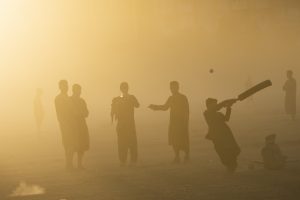The Taliban’s ascendancy in Afghanistan has caused confusion and uncertainty in the entire country. Among other things, a feeling of ambiguity clouds all kinds of sporting activities. Before going into the details, it is apt to ask how sports fared during the Taliban’s first tenure in power from 1996-2001, as well as after their fall in the wake of 9/11.
After coming into power, the Taliban imposed a prohibition on nearly all kinds of entertainment. Sports such as football, cricket, and Buzkashi were also banned. The group justified this by labeling sports un-Islamic, for they perceived games of many kinds to be against Islam.
Sports suffered a heavy loss when the Taliban were in power. In 1999, Afghanistan’s membership in the International Olympic Committee was suspended and Afghanistan was banned from the 2000 Summer Games in Sydney. However, in the last moments of their rule, the Taliban began to show some flexibility. The ban on cricket was lifted in 2000. A year later, the Afghanistan national cricket team was established. Except for cricket, all other sporting activity remained suspended in the country.
Sporting activities picked up in Afghanistan after the Taliban were forced out of power by U.S.-led forces. Athletes felt emboldened enough to practice playing their respective sports again. The country began to make tangible progress. Afghanistan’s membership in the IOC was reinstated in 2002, and two years later in 2004, the country sent five athletes to the summer games in Athens, Greece, including two women. Although the women — sprinter Robina Muqim Yaar and judoka Friba Razayee — did not earn medals, they made history as the first women to ever represent Afghanistan at the Olympics.
Cricket, in particular, has made great headway since the fall of the Taliban’s first regime. The Afghanistan national cricket team, as Pakistani Prime Minister Imran Khan said, accomplished within 20 years progress that other nations took 70 years to achieve. Within a short period of time it has achieved a number of milestones. In 2011, Afghanistan beat Ireland and has surpassed many cricket playing countries such as the UAE and Kenya. Afghanistan has produced cricketers such as Muhammad Nabi and Rashid Khan, who, because of their talent, are highly sought-after players in international Twenty20 franchises of considerable repute like Australia’s Big Bash League (BBL), the Pakistan Super League (PSL), and the Indian Premier League (IPL).
Now that the Taliban are in power again, fears are widespread that sports will suffer a setback should the Taliban enact their previous prohibitions. Such fears are justified given the beliefs and principles that the Taliban hold and aspire to impose on the nation. It is still not clear as to what their approach to sports will be.
Given that in early September, the Taliban approved the Afghanistan Cricket Board’s plans for the national team to tour Australia, it is expected that cricket may be allowed to exist without interference. The CEO of the Afghanistan Cricket Board, Hamid Shanwari, has expressed gratitude to the Taliban for being generous toward cricket. This bodes well for cricket at least.
However, it goes without saying that women’s sports will cease to exist. The Taliban’s policies toward, and treatment of, women have always attracted condemnation from international observers and Afghans alike. The sportswomen who enjoyed freedom to polish their talents in their respective sports will not be allowed to do any sporting activities under the Taliban. Even women’s education is being limited; so too will any sporting activities.
As the Taliban have held almost all sports in contempt, many sportsmen and women are apprehensive about their future in the country, especially women now barred from their sports. The dramatic fall of 19-year-old Zaki Anwari, who played on Afghanistan’s national youth football team and attempted to escape the country by clinging to the outside of a departing U.S. military plane in mid-August, illustrates the desperation of Afghanistan’s youth and its athletes. Many of Afghanistan’s women footballers have fled the country.
Amidst this chaos, the Taliban have promised to be different this time around. Their announcement of a general amnesty was mildly encouraging although the group is failing to deliver on its promises. Fans and athletes hope the Taliban take a different approach to sports this time around, and if they do it will contribute to transforming their global image, too.
Sports is a demonstration of peace. They are something that even advanced nations feel proud of. As for Afghanistan, sports in the country stands at an important juncture. If sports is allowed to resume, then Afghanistan will surely become one of the best sporting nations in the world — if the nation’s cricket team is anything to judge its potential by.

































